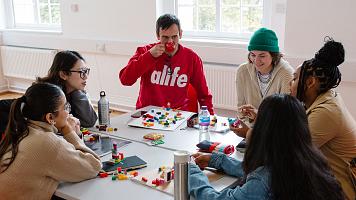MPhil/PhD
Institute for Creative & Cultural Entrepreneurship
Content navigation menu
Why study an MPhil/PhD at the Institute for Creative & Cultural Entrepreneurship
The Institute for Creative and Cultural Entrepreneurship has a strong research base in all areas of cultural policy, cultural diplomacy, arts management, and creative, cultural and social entrepreneurship.
-
The Institute for Creative and Cultural Entrepreneurship (ICCE) provides a unique environment to study and research, with world-leading academic thinkers within a university globally recognised for its research excellence.
-
ICCE is the editorial home of leading journals Theory, Culture & Society – ranked No.1 in Cultural Studies over the last five years – and Body & Society.
-
The department welcomes proposals from highly qualified individuals who wish to pursue PhD degrees. These research projects should be of the highest quality, in keeping with Goldsmiths' reputation as a leading producer of exceptional research.
Contact the department
If you have specific questions about the degree, contact ICCE.
Length
3-4 years full-time or 7-8 years part-time
Fees
Home - full-time: £TBC
Home - part-time: £TBC
International - full-time: £TBC
Department
You'll research
Overview
You'll be supervised by a full-time member of staff, generally agreed during the preliminary discussions regarding your research with the ICCE Director. PhD theses are up to a maximum of 100,000 words.
You should aim to complete and submit your PhD thesis within the time-frame specified by Goldsmiths. This is normally three to four years for full-time students.
A thesis for the award of MPhil may be submitted after two years of full-time or three years of part-time study. Registration can be changed from full-time to part-time status, and vice-versa, with the agreement of your supervisor.
Research training programme
All students enrolled in the MPhil/PhD programme are initially required to attend a weekly seminar in research methodology conducted by the Goldsmiths Graduate School. These seminars are designed to bring together research students with diverse interests in a cooperative and stimulating environment.
Its objectives include training students for the Spring Review Week, written and oral presentations, preparation for upgrading procedures, and publication of articles.
Assessment
Examination is by thesis and a viva.
Research areas
We are particularly interested in hearing from people interested in carrying out research into:
- Cultural and creative entrepreneurship
- Creative industries
- Business models for the creative economy
- Social entrepreneurship
- Cultural tourism
- Culture and regeneration
- Cultural relations and diplomacy
- Audience development
- Cultural policy
- Consumer culture
- The body
- Visual culture
- Urban culture
Current PhD students
Current PhD studies being undertaken by research students in ICCE include:
- 21st-century competencies
- Leadership of arts and cultural organisations
- Personalisation of the arts offer
- Value and how to assess this in the creative industries
- Audience development
- The business of comedy
- Applied conceptual art
- Cultural diplomacy
- Urban mobility experience and transport
- Urban culture and the open city
- Food culture
What our students say

Careers
Possible careers following your research degree include:
- Academia
- Research
- Practice-orientated work
- Development work
- Work in social innovation and social economy
- Work in the arts and cultural sector and cultural and creative industries
- Publishing
Find out more about the Goldsmiths Careers Service.
Fees and funding
Annual tuition fees
These are the PG fees for students starting their programme in the 2025/2026 academic year.
- Home - full-time: £TBC
- Home - part-time: £TBC
- International - full-time: £TBC
If your fees are not listed here, please check our postgraduate fees guidance or contact the Fees Office, who can also advise you about how to pay your fees.
It’s not currently possible for international students to study part-time under a student visa. If you think you might be eligible to study part-time while being on another visa type, please contact our Admissions Team for more information.
If you are looking to pay your fees please see our guide to making a payment.
Funding opportunities
AHRC studentships
Research projects by MPhil/PhD applicants for any Goldsmiths department oriented towards arts and humanities research are eligible to be considered for funding. Find out more about current Arts and Humanities Research Council (AHRC) funding opportunities.
Goldsmiths scholarships and studentships
Explore the Goldsmiths scholarships finder to find out what funding you may be eligible for.
Paying your fees
Find out about paying your tuition fees.
Additional costs
In addition to your tuition fees, you'll be responsible for any additional costs associated with your course, such as buying stationery and paying for photocopying. You can find out more about what you need to budget for on our study costs page.
There may also be specific additional costs associated with your programme. This can include things like paying for field trips or specialist materials for your assignments.
Entry requirements
You should normally have (or expect to be awarded) a taught Masters in a relevant subject area.
You might also be considered for some programmes if you aren’t a graduate or your degree is in an unrelated field, but have relevant experience and can show that you have the ability to work at postgraduate level.
International qualifications
We accept a wide range of international qualifications. Find out more about the qualifications we accept from around the world.
If English isn’t your first language, you will need an IELTS score (or equivalent English language qualification) of 6.5 with a 6.5 in writing and no element lower than 6.0 to study this programme. If you need assistance with your English language, we offer a range of courses that can help prepare you for postgraduate study.
How to apply
You apply directly to Goldsmiths using our online application system.
If you would like to apply for an MPhil/PhD programme at ICCE, first you should have a look at our departmental web page and our staff profiles to make sure there is a good 'fit' between your suggested research questions and ICCE’s areas of interest. Moreover, it is essential that your proposal fits with staff expertise. This will ensure you a high-quality research experience.
Before submitting your application you'll need to have:
- Details of your education history, including the dates of all exams/assessments
- The email address of your referee who we can request a reference from, or alternatively an electronic copy of your academic reference
- Contact details of a second referee
- A personal statement – this can either be uploaded as a Word Document or PDF, or completed online
- Details of your research proposal (see below for guidance)
- If available, an electronic copy of your educational transcript (this is particularly important if you have studied outside of the UK, but isn’t mandatory)
You'll be able to save your progress at any point and return to your application by logging in using your username/email and password.
Before you start at Goldsmiths, the actual topic of your research has to be agreed with your proposed supervisor, who will be a member of staff active in your general field of research. The choice of topic may be influenced by the current research in the department or the requirements of an external funding body.
If you wish to study on a part-time basis, you should also indicate how many hours a week you intend to devote to research, whether this will be at evenings or weekends, and for how many hours each day.
Your research proposal
Along with your application details, personal statement and academic reference, you should also upload a research proposal at the point of application.
This should be in the form of a clear, concise and coherent statement of the proposed area of research of at least five pages and no more than seven pages of A4. The research proposal should include:
- A working title for your research project.
- A clear statement about what you want to work on and why it is important, interesting, relevant and realistic. You should detail your main research objectives: these could be articulated as hypotheses, propositions, research questions, or problems to solve. What difference do you think your research will make? Is your research achievable in the time allocated? (for example, 3 years full‐time)
- Some background knowledge and context of the area in which you wish to work, including key literature, key people, key research findings. Think about how your work links to the work of others in the same or related fields.
- Some consideration of the methods/approach you might use. How will you conduct your research? Will you use existing theories, new methods/approaches or develop new methods/approaches?
- Some indication of the strategy and timetable for your research project and any research challenges you may face. What would be the main stages of your project and what would you expect to do in each year of your PhD?
- A short list of the key references that support your research proposal. References should be listed in an appropriate convention (eg Harvard). Such references should be used throughout your research proposal to demonstrate that you have read and understood the work of others. Other relevant material that you are aware of, but not actually used in writing your proposal, can also be added as a bibliography.
When to apply
We accept applications from October for students wanting to start the following September.
We encourage you to complete your application as early as possible, even if you haven't finished your current programme of study. It's very common to be offered a place conditional on you achieving a particular qualification.
If you're applying for external funding from one of the Research Councils, make sure you submit your application by the deadline they've specified.
Applicants will be interviewed, by telephone or online video call for those not based in the UK. If this is the case, we will contact you to arrange a suitable time for the interview.
Find out more about applying.
Contact us
If you would like to make an enquiry about MPhil/PhD study before submitting an application, please contact us. In order to allow us to respond to your message efficiently, you may want to include the following information:
- Introduce yourself: Who are you and what activities/organisations are you currently engaging with? What is your academic background? Have you received some research training in the past? What is your main discipline at the moment?
- Indicate your subject area(s) of interest: Describe which general subject area within ICCE you're interest in.
- Describe your research interests: Which research areas and questions are you interested in? Which theoretical and conceptual approaches seem relevant to you? What kind of data might you need for your project?





